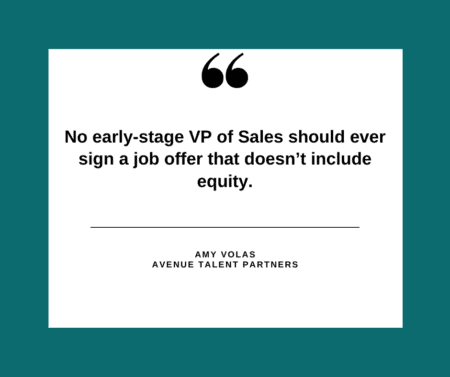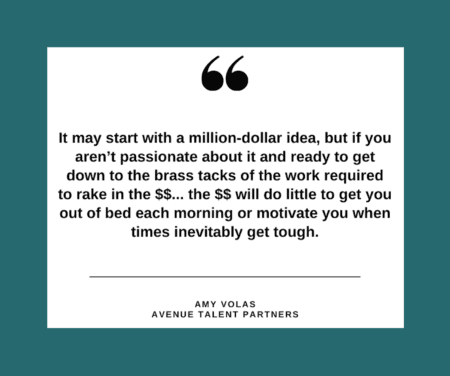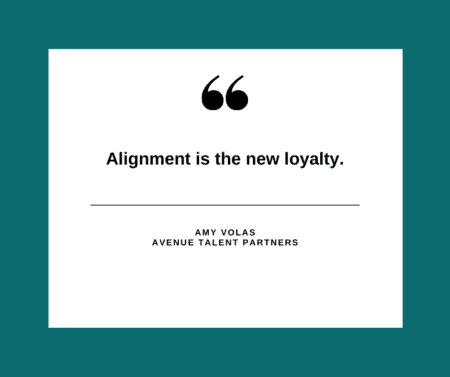
VP of Sales Considering a New Startup? Read This Before Signing Any Paperwork!
What should you know as a VP of Sales considering a new startup?
That the grass isn’t always greener on the other side.
Sure, you might be feeling stuck, underutilized, and under-appreciated currently.
Maybe you’re up against a resistant Founder and board that won’t implement the changes you need to make a real impact. Or maybe you’re dealing with a sales manager on your team who’s created so much turnover that it’s hard to keep sales afloat, let alone grow.
You might even find yourself somewhere in between as a passive job candidate. While you’re not actively looking for opportunities, if a new offer lands in your lap, you need to know whether it’s worth jumping ship for.
So no matter which group you fall under, if you’re a VP of Sales considering a new role within a startup, you can’t afford to make a mistake and fall for the mirage of greener pastures.
Do this, and you could spend months upon months working to recover from a hasty decision riddled with regret.
Plus, you may not have a strong story to tell during your next job interview, setting back your career gains by who knows how much.
Take this route, and you’ll be even more unhappy at the end of it all.
That’s why I’m here to help! This guide will help you avoid all that career catastrophe and set you up for success.
I’ll show you what to look for as a VP of Sales considering a new role at a startup. Then you’ll learn how to identify the right fit for your career goals from one that only seems that way.
What Should a VP of Sales Look For in a New Startup Role? 3 Important Factors to Consider
Many VPs make the mistake of chasing the shiny objects to only consider compensation when deciding whether to accept a new position. Then they wonder why these roles don’t end up working out.
Sure, compensation matters. But it’s not the only factor, nor is it even the most crucial factor, as you’re about to see.
So let’s talk about the compensation plan first and get it out of the way:
1. Is the Compensation Plan Really All It’s Cracked Up to Be?
Naturally, the compensation package is one of the first things to pay attention to when offered an executive leadership role within sales.
But this encompasses so much more than just the base salary, bonuses, and other incentives. In reality, your VP of Sales job should cover these three key components (at the very minimum):
- Equity
- On-target earnings (OTE)
- The big picture
I know that last one may feel like we’re jumping the gun here, but trust me, you’ll want to think this one through too.
Before we get to why, let’s dive into the first two items on that list, starting with equity:
Don’t Sign On the Dotted Line Without Equity On the Table

Savvy VPs know they’re in it for the long haul. They know they’re entitled to a piece of the pie they’ll work tirelessly to bake. And they’re smart enough to think ahead and negotiate a fair exit when an event happens or things don’t work out.
Be like them.
Equity gives you a meaningful stake in the company that you’re working tirelessly to grow and scale.
It means you’ll have a little chunk of your success to take with you as a reward for your effort.
So usually the next question becomes:
How Much Equity Should A VP of Sales Get In A Startup?
Most VPs of Sales receive between .5% and 1.5% equity, on average.
It’s essential to know whether there’s equity on the table for the startups you’re considering, what it’s actually worth, and if it falls within that industry-standard range.
On top of having equity, consider any outstanding shares, the overall pool, funding, and anything else that could potentially dilute what you’d receive in the long run before you sign on the dotted line.
You should also know the difference between equity, shares, and stock — *hint* they’re NOT created equal. Figure these out so you really know what you’re getting in return for your effort. Then decide if it’s truly worth making the switch to this new role.
Let’s move on to the second component of your compensation package:
Be Smart and Savvy About On-Target Earnings (OTE)
There’s no doubt that achieving on-target earnings (OTE) is a top priority for VPs of Sales and Founders alike.
Adding language to your offer letter about key milestones and what happens when you reach those milestones ensures that both parties are crystal clear on the task at hand. Plus, you’ll both have skin in the game creating extra assurance that you’re on the same page and working towards the same goals TOGETHER.
So you can approach this in a variety of ways: with accelerators, milestones, bonuses, special projects, or performance-based incentives.
The key is to figure out which combination works best for your situation. What will actually motivate you so both you and the company you’ll be transforming benefit from your hard work?
It’s best to have an idea of what’s worked well for you before, so you can compare that to what the new role offers.
Finally, your compensation plan must include this often overlooked component:
Think About the Big Picture
No one wants to start a new gig with the thought that it may not work out.
And we’re not suggesting that you go into this new opportunity with a self-fulfilling prophecy mindset that it will inevitably fail or end.
But, let’s get real: startups are unpredictable by nature. And with the average tenure of a VP of Sales in tech between 16 – 24 months, this is important to understand.
What if this startup catches the eye of a larger company and gets bought out?
Their team may decide to bulldoze everyone at the top of the food chain because they want to bring in their own team. So where does that leave you?
To avoid this, look for what’s known as a “trigger” clause within your employment agreement.
A trigger (double or single) essentially means that some or all of your unvested options are accelerated if the company gets acquired (Single Trigger) and you end up on the chopping block when the new team takes over (Double Trigger).
These financial considerations should be a top priority, especially in the dynamic world of startups. They could mean the difference between a big payoff and measly table scraps.
Now, keep in mind, compensation isn’t the only thing to consider. These other two factors are just as vital to ponder:
2. The Team You’ll Be Working With
We collect A LOT of data from the interviews we conduct, here at ATP. Executive leadership (Founders, Board, and the executive team) is the top reason sales leaders take our call. It’s also one of the top three factors they consider the most when interviewing. Remember, it starts at the top and is important to understand if you truly have a seat at the table to deliver results.
Another significant piece of the puzzle is the team you’ll be inheriting.
Are the employees already burned out and tired of yet another sales leader to adjust to? Are they a sinister crew of people plotting your demise? Do they have all of the raw ingredients and are craving leadership they can get behind? Or are they a well-oiled machine ready to build on their existing processes and catapult growth?
As the newly minted VP of Sales, it will be up to you to understand the current state of affairs and adjust roles as you see fit. You’ll need to move the right people, into the right roles, to do the right work to ensure maximum growth. That includes making the tough calls to gracefully exit people out of the company that don’t fit.
Depending on what needs to be done, your arrival might create an unprecedented shake-up. You’ll either be met with resistance or allegiance.
So the question becomes: Who is truly onboard with your direction?
Sure, your new Founder may be.
But what about the other people on the executive team and the rest of the board? Will they allow necessary sweeping changes? Or are they going to be so reluctant that they prevent you from getting what you need done?
It’s essential that you truly have a seat at the executive table and you do the right work to keep it to ensure you’re enabled to make the decisions that are necessary to grow. The second you lose that seat is the moment you’re relegated to little more than a figurehead.
Pro tip: Look for a strong, supportive, visionary CEO. You don’t want your boss to be constantly changing their mind because of the latest article, LinkedIn posting, SaaS trend, question from the board, or misinterpretation of your marketplace.
You won’t know these answers by searching their website or reading everyone’s LinkedIn bios. You have to dig deeper to uncover these answers during your interviews, while looking for the “tells.”
Here’s How To Gauge Your Potential Team, Other Execs, and Board Members During Your Startup Job Interviews
Your job interviews should be more than showing potential employers why you’re the right fit for a role. It’s the best time to assess whether the organization is the best fit for you and your career goals.
So how do you do that?
Ask about the other executives on the team and the board members. What are they like? Where are they showing interest? What about resistance?
Then… spend meaningful time with these people to see for yourself. Look for the gaps between what you were told and what you saw firsthand. Make sure you use a scorecard to make sure you’re rooted in reality versus perception.
It’s paramount to have a seat at the executive table. This gives you the power and influence to make decisions necessary for your team to reach important milestones.
Ideally, you need to know what that looks like before accepting the position.
If it’s going to be an uphill battle with people who will never give you a say or work against you to support their own agenda every step of the way, that’s a major red flag, despite how awesome it may appear on paper.
Pro tip: If they’re reeling from a mishire, ask questions about the lessons learned from getting the last hire wrong. Look for accountability, humility, lessons learned, and avoid the blame game.
Pick the Founder’s brain about the existing sales team. Do they have an appreciation for sales? Is the sales team a revolving door? Do they have their finger on the pulse of what’s happening with their buyers? How are they supporting the team to succeed?
Encourage the Founders you’re interviewing with to share the good and the bad, dig into the data, spend time with the team… make sure you really know what you’re getting into.
Show confidence in your ability to expand on what’s working and what you can do to turn around what’s subpar. Back these big statements up with the how, and you’ll be first on their list to hire (even if you later turn down the offer).
After all, a seemingly lucrative offer may not be such a handsome reward if you don’t know what you’re really getting into.
Assess the CEO. A strong, supportive, visionary CEO is an incredible asset, especially in the startup world. You want them to welcome intelligent suggestions, collaborative pushback, and strategic plans to chart the course you both will follow.
What you don’t want is someone who constantly changes their mind depending on what the board or their colleagues outside of the company tells them to do. You also don’t want someone who blindly follows whatever podcast they listen to suggests.
Look for CEOs who carefully analyze the pros and cons when the wind blows a new idea their way before changing course. They’ll make it much easier for you to achieve stability and growth simultaneously.
On the other hand, a CEO that shifts in the breeze will only generate constant changes, disruptions, and monumental errors.
So as you evaluate a new startup, think about who you’ll be working with on every level — from the sales team your sales manager is running to the CEO you’ll be directly reporting to. And pay close attention to how they show up in each step of the interview. Are they talking “at” you or “with” you. It’s a big difference!
But before you sign any paperwork, there’s still one more factor to add to your checklist:
3. Whether You’re Truly Aligned with the Product, Service, or Mission
Here’s where you need to get brutally honest with yourself: Do you really care about what this company is trying to sell and can you stand by it through the good AND bad times?

If you care less about the product:
You won’t be able to dedicate 100% of your energy and focus to this work, which will dramatically affect your output and mental state. It will be nearly impossible to go the extra mile when the tank is empty and you’re running on fumes.
You’ll lack that hunger and drive to innovate, leading to a much harder time overcoming obstacles and roadblocks.
It will be hard to inspire your team to succeed. You set the tone as an executive leader. No amount of money will help you “fake it ‘til you make it” here. When your team sees through this facade, they’ll start working around you instead of with you.
All of this will snowball into an icky mess, where no one’s happy, lackluster results, and an inevitable chopping block.
It’s hard to dedicate 100% of your energy and focus on something you could care less about, and this absolutely will affect your results. So before jumping into anything new, ask yourself these questions:
-
What’s important to you?
-
What is it that you’ve loved about your current or past roles?
-
Is the work that’s required to succeed here in line with where you can truly help?
-
Why are you drawn to this product and this company?
-
How do you connect with what they’re offering?
-
Would you be proud to work here and want to scream it from the mountaintops?
-
What does my scorecard tell me versus what my gut says?
Answering these questions will help you discover whether you’re really aligned with the company and product or just getting caught up in the shiny objects.

Stumped? Use my secret sauce for success to get to the bottom of this significant component next.
Many VPs mistakenly chase the shiny objects (high salary, unsubstantiated big statements, killer bonuses, etc.) without considering this aspect. They think, “A job’s a job, and I don’t have to be excited about selling everything.”
But not having a passion for the company and not believing in what you’re doing will ultimately leave you unfulfilled in this new role and looking for other jobs shortly after.
Don’t get to that point.
Do the heavy lifting here to uncover tangible reasons why you’re the company’s biggest fan.
Nothing will stop you when you’re genuinely aligned with the product, team and mission. No problems or obstacles will be too great to overcome. You’ll inspire everyone around you to give 110%. And you’ll be excited to drive incredible results as a team.
Make no mistake, there’s a BIG difference between a job move and a career move. Look for the career moves and watch the magic unfold for the long haul.
Final Thoughts for a VP of Sales Considering Something New
This guide is a roadmap to dive deeper into every potential role and offer that comes your way. You’ll know exactly how to evaluate whether the grass is actually greener on the other side or if it’s just a mirage in the desert.
After all, it’s what you’re running to not from that matters. The last thing you want to do is waste precious time in the wrong role.
Follow these tips, and I’m confident you will shine bright to defy the turnover odds!
